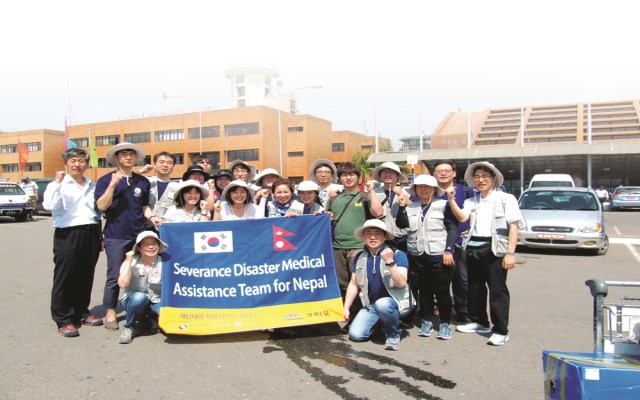Yonsei News
-
[SERVANT LEADERSHIP] Crisis Response Medical Safety Network Deploys Team to Nepal to Treat Earthquake Survivors
연세대학교 홍보팀 / news@yonsei.ac.kr2015-07-10 -
Crisis Response Medical Safety Network Deploys Team to Nepal to Treat Earthquake Survivors
On May 29, the Yonsei Crisis Response Medical Safety Network sent a Medical Support Service Team to Nepal to assist in recovery efforts following the country’s earthquake disaster. Leading the team of twenty was Professor Kim Moon-gyu; he was joined by ten doctors, eight nurses, a pharmacist, and a paramedic.
The Medical Support Service Team was deployed to the village of Ryalale in Kavre District, one of the areas hardest hit by the earthquake. There, the team established a medical camp, providing basic medical services to the local population, including mental health support. Team specialists were able to offer some specialized medical services as well, such as ultrasonography and electrocardiograms. In total, 883 local patients, along with 242 Koreans living in Nepal, received medical attention at the camp.
The team also set up operations in two schools in Ryalale: Shree Valchindra Lower Secondary School and Shree ShantiNiketan Higher Secondary School. At the schools, the team provided treatment for infectious diseases, external wounds, and trauma. All of the team’s efforts were well received by the local residents, who were grateful for the professional care and comfort provided to them.

According to team members, they encountered several cases in which patients complained of abnormal chest pain, nausea, and headaches following the earthquake. Because these are potential signs of trauma, the team hastened to properly diagnose and treat these patients, including providing psychological care. It is hoped that the quick medical intervention will allow these individuals to recover more quickly and avoid symptoms of post-traumatic stress in the future.
In their efforts in Nepal, the Yonsei Medical Support Service Team was assisted by the Korean non-governmental organizations Cooperation and Participation in Overseas NGOs (COPION) and Global Care.
- vol. All
- vol. 1243
- vol. 1122
- vol. 125
- vol. 124
- vol. 123
- vol. 122
- vol. 121
- vol. 120
- vol. 119
- vol. 118
- vol. 117
- vol. 116
- vol. 115
- vol. 114
- vol. 113
- vol. 112
- vol. 111
- vol. 110
- vol. 109
- vol. 108
- vol. 107
- vol. 106
- vol. 105
- vol. 104
- vol. 103
- vol. 102
- vol. 101
- vol. 100
- vol. 99
- vol. 98
- vol. 97
- vol. 96
- vol. 95
- vol. 94
- vol. 93
- vol. 92
- vol. 91
- vol. 90
- vol. 89
- vol. 88
- vol. 87
- vol. 86
- vol. 85
- vol. 84
- vol. 83
- vol. 82
- vol. 81
- vol. 80
- vol. 79
- vol. 78
- vol. 77
- vol. 76
- vol. 75
- vol. 74
- vol. 73
- vol. 72
- vol. 71
- vol. 70
- vol. 69
- vol. 68
- vol. 67
- vol. 66
- vol. 65
- vol. 64
- vol. 63
- vol. 62
- vol. 61
- vol. 60
- vol. 59
- vol. 58
- vol. 57
- vol. 56
- vol. 55
- vol. 54
- vol. 53
- vol. 52
- vol. 51
- vol. 50
- vol. 49
- vol. 48
- vol. 47
- vol. 46
- vol. 45
- vol. 44
- vol. 43
- vol. 42
- vol. 41
- vol. 40
- vol. 39
- vol. 38
- vol. 37
- vol. 36
- vol. 35
- vol. 34
- vol. 33
- vol. 32
- vol. 31
- vol. 30
- vol. 29
- vol. 28
- vol. 27
- vol. 26
- vol. 25
- vol. 24
- vol. 23
- vol. 22
- vol. 21
- vol. 20
- vol. 19
- vol. 18
- vol. 17
- vol. 16
- vol. 15
- vol. 14
- vol. 13
- vol. 12
- vol. 11
- vol. 10
- vol. 9
- vol. 8
- vol. 7
- vol. 6
- vol. 5
- vol. 4
- vol. 3
- vol. 2
- vol. 1
- Show All
- COVER STORY
- YONSEI NEWS
- INTERNATIONAL RELATIONS
- Yonsei Global
- RESEARCH FRONTIER
- SERVANT LEADERSHIP
- YONSEI PEOPLE